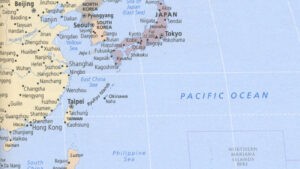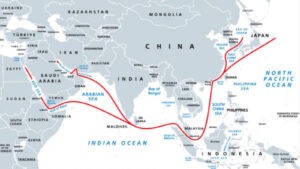BY STAS MARGARONIS, RBTUS
If China takes over Taiwan, it would be “the most revolutionary situation in security terms in East Asia since the rise of Japanese power in the 1930s and the outbreak of World War II”, according to Peter Enav, Editor of the Taiwan Strait Risk Report.
Enav emphasized that President Donald Trump’s decision to support Taiwan or accede to a Chinese take-over is a critical national security question.
Reflecting concerns in Japan, a January Nikkei Asia report worries that in upcoming negotiations between the Trump Administration and China: “Beijing may request that the U.S. change its wording on Taiwan, shifting, for instance, from “not supporting” Taiwanese independence to “opposing ” it.” [1]
Enav warned that increased Chinese pressure on Taiwan could lead to restrictions on ocean shipping to the island, higher marine insurance rates and possible restrictions on the sale of high-end semiconductors, made in Taiwan, to the United States.
Enav spoke at a Propeller Club of Northern California webinar produced in cooperation with the California State University Maritime Academy on January 21, 2025.
Peter Enav has spent 17 years living and working in Asia, including nine (2005-2014) as the head of the Taipei bureau of the Associated Press, where he closely monitored Taiwan defense issues.
During the Propeller Club presentation, Enav noted: “China claims that Taiwan belongs to it and has done so essentially since … the founding of the People’s Republic of China in 1949. What is different now is that for the first time in the history of the People’s Republic of China, it has the ability to do something about it. That is on the back of tremendous investments in the Chinese military since the mid … 1990s. It’s on the back of a single-minded interest in bringing Taiwan into the fold on the part of Xi Jinping, the Chinese leader.”
Under Chinese President Xi Jinping, the threat to Taiwan has grown: “He’s instructed the People’s Liberation Army to be ready to move against it by 2027 … It is very clear that Taiwan and, to some extent of course, the United States (are) facing a grave challenge. Now, Taiwan is a democracy of 24 million people, about 90% of whom, according to public opinion polls that have been conducted over the last 15 years with very little change, about 90% of whom opposed a Chinese political takeover since June of 1950 when the United States entered the Korean War.”
The problem today is that Taiwan is not making a sufficient effort to maintain its independence, Enav says: “Taiwan …faces some major problems. One of those problems, probably the main one, … is its lack of political resiliency, which stems from a self-delusion about the nature of the Chinese threat. Many, many Taiwanese are essentially in denial about how acute that threat is. It suffers from toxic domestic politics. It suffers from poor civil military relations and it is being further undermined by a very aggressive Chinese fifth column which I would argue is being led by a former Taiwanese president who has a lot of influence.“
U.S. SUPPORT CRUCIAL
Taiwan’s ability to withstand pressure from China is also being undermined by lack of sufficient support from the United States: “The U.S. has played a vital role as Taiwan’s protector since the outbreak of the Korean War … in June of 1950 … up until the … present day. The U.S. commitment was particularly conspicuous under President Biden’s leadership. Biden said on four separate occasions that were the Chinese to attack Taiwan, the U.S. would respond by sending American military assets to help defend Taiwan. That goes beyond … the Taiwan Relations Act of 1979, which commits the United States to making military hardware available to the Taiwanese to help them defend themselves and is … behind … the … significant American military transfers to Taiwan. The Taiwan Relations Act is deliberately ambiguous about whether the U.S. would come to aid Taiwan in the event of a Chinese attack. But as I say, President Biden seemed to change that.”
The U.S. commitment has come under question with the new Trump administration:” However for the past day plus two or three hours, there’s a new sheriff in town. President Trump has a very, very different view of Taiwan than President Biden or indeed every United States leader since June of 1950. President Trump sees Taiwan as small and unimportant, particularly within … the context of his America first ideology, and he questions the need to help defend it. He claims unfairly that Taiwan destroyed the American chip industry. And he claims relatively fairly, that Taiwan … might be unwilling to defend itself. And the … obvious question here: if the Taiwanese are unwilling to defend themselves, why should the United States devote blood and treasure to helping the Taiwanese out?”
GRAY ZONE WARFARE
To avoid a direct military conflict with the United States, Enav says, China has begun focusing on a strategy called “gray zone” warfare using pressure tactics and suggesting a lack of U.S. support to demoralize Taiwanese resistance with the support of pro-China elements in Taiwan: “A particular strategy in which China seeks to … erode Taiwanese morale to the point where it basically capitulates on its own … is “gray zone “… war strategy (which) begins in earnest in 2020, with a big increase of Chinese aerial incursions of Taiwan. After the (House Speaker) Pelosi visit to Taiwan in August of 2022, it morphs into an effort that effectively culminates in the elimination of the informal median line along the Taiwan Strait. And as Chinese exercises just last month showed China now has the ability to surround Taiwan with air and … sea assets and at the same time to threaten area access denial against the U.S. and possibly Japanese forces who might come to Taiwan’s aid in the event of a … Chinese attack. So that is what the Chinese are doing with this “gray zone” strategy … move very, very incrementally.”
Retired U.S. Navy Vice Admiral Michael Dumont, President, California State University Maritime Academy agreed with Enav’s assessment:
” They’re clearly using significant diplomatic means (along with) informational, as well as the gray zone military tactics that Peter mentioned. I think we need to expect this to continue. My greater concern is if the Chinese miscalculate and cause an escalation … that they had not anticipated. The other thing they are trying to do is trying to reduce confidence of the Taiwanese people in themselves, in their economy and in their leadership. And I think this will also continue. What a U.S. response would be, would depend on how the conflict started and how much advanced notice there was, what our military posture was at the time … But I think these implications are very real and the threats to us and to the global economy are significant. And there would be huge impacts to global shipping and global energy supplies and the insurance industry also, as Peter mentioned.”
Christopher Chiego, a California Maritime Academy professor, warned that a Chinese blockade to pressure Taiwan into surrender would need a substantial military sealift response from the United States to thwart.
Retired U.S. Coast Guard Rear Admiral Joel Whithead, Executive Vice President of the International Propeller Club, said that there is proposed legislation in Congress, entitled the SHIPS ACT, which would create a 250 ship U.S. merchant shipping fleet. The proposed legislation is supported by the Propeller Club and could address the need for a stronger U.S. military sealift capability.
IMPLICATIONS
Enav says the implications to the Pacific region of a Chinese take-over of Taiwan are enormous and could impaact global shipping.
Enav listed the following implications that could impact global shipping and the global supply of semiconductors of which Taiwan is a major manufacturer:
- Big increase in shipping insurance premiums amid credible threats of disruption
- Potential threat to high end semiconductor supply chain:” TSMC (Taiwan Semiconductor Manufacturing Company) provides about 60% of the world’s high performing computer chips.”
- Dramatic increase in China’s ability to project naval power beyond East Asia threatening Hawaii and Guam
- Strong incentives “for U.S. Asian allies like Japan and South Korea to make their own deals with Beijing”
- The end of Taiwan’s democracy
- The end of the American Century
BACKGROUND
Enav has spent most of his life in East Asia beginning with his military service during the Vietnam War:” I would say that my entire career has been involved … in East Asia in one form or another. When I was much younger, I was a light weapons infantryman in Vietnam. I served in the U.S. Embassy in Thailand in the 1980s as part of this. I’ve been following this situation extremely closely since I started out with my first visit to Taiwan in 1968.”
For further information on Taiwan Strait Risk Report, please contact Peter Enav: peterenav@gmail.com, +61 480 289 200, Taiwanrisk.com
FOOTONOTE
[1] https://asia.nikkei.com/Newsletters/Indo-Pacific-Diaries/Indo-Pacific-Diaries196?si=48aa74a8-b49f-4cfb-9af2-fab861422636&del_type=11&pub_date=20250122233000



